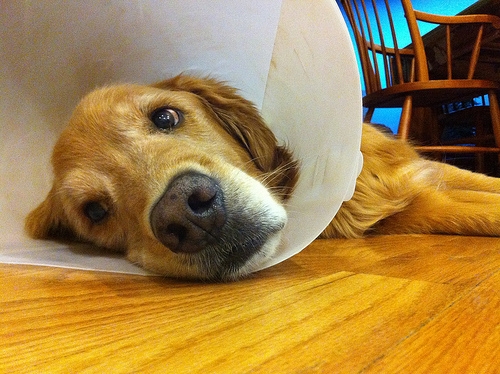Did you know that a single flea can bite its host several hundred times per day? Given the fact that most residential infestations involve 500+ fleas, eggs, larvae and pupae, it’s easy to see just how much of a problem they can be, especially for dog-owning families. Dogs do a pretty good job at hiding their pain and discomfort, but having these tiny invasive parasites feeding on your blood throughout the day can be a nightmare.
What Is Spot-Treatment?
We’ve discussed several different methods on how to protect dogs from fleas here on our website, but something we haven’t talked about is spot-treatment. Spot-treatment refers to flea treatment methods which target problematic areas. So instead of fogging or bombing your house, for instance, you could spot-treat it with an appropriate product. Of course, this is just one example of a spot-treatment method. There are literally dozens of different ways to spot-treat a pet and/or the environment for fleas, some of which we’re going to discuss here.
Benefits of spot-treatment include the following:
- Cost-effective.
- Takes less time.
- Uses less chemicals.
- Generally viewed as safer (when compared to flea collars and bombs).
Vinegar Spot-Treatment For Dogs
Arguably, one of the safest and most effective spot-treatments for dogs is a solution of half white apple cider vinegar and half water. Mix the solution in a spray bottle and apply it throughout your dogs coat — anywhere that you notice flea activity. The solution of diluted vinegar will kill fleas on contact, and it will also deter other fleas from attacking your dog. Best of all, vinegar is a safe, all-natural product, so you don’t have to worry about exposing your dog to potentially harmful chemicals.
Lemon Juice
Another powerful spot-treatment for killing and preventing fleas on dogs is lemon juice. Squeeze the juice out of 2 whole lemons (use fresh lemon juice, not juice from concentrate) and mix it with water in a spray bottle. Now, follow the same method as previously mentioned — comb through your dog’s fur and apply the diluted lemon juice in areas of high flea activity. Use caution to ensure the lemon juice doesn’t get in your dog’s eyes. Although it won’t cause any serious harm, it will certainly sting. If you accidentally get lemon juice in your dog’s eyes, flush it out with fresh water.
Still struggling with a severe flea infestation? We’d love to hear your story in the comments section below!

